

Max Roach Discography. Dave Tough. Biography[edit] Born in Oak Park, Illinois, Tough's interest for drumming was not fully supported by his family or community.
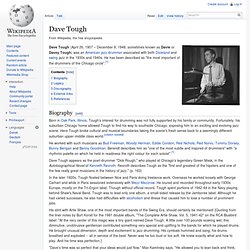
Fortunately, his suburban Chicago home allowed Tough to find his way to southside Chicago, exposing him to an exciting and evolving jazz scene. Here Tough broke cultural and musical boundaries taking the scene's fresh sense back to a seemingly different suburban upper-middle class world. [citation needed] Jazz Discography Project. Jack Noren. Jack Noren (October 19, 1929, Chicago - March 17, 1990, Chicago) was a jazz drummer and vocalist born in America but best known for his work in Sweden.
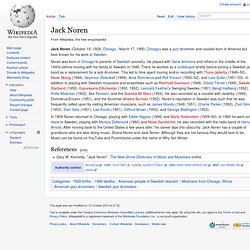
In 1954 Noren returned to Chicago, playing with Eddie Higgins (1958) and Marty Rubenstein (1959–60). In 1960 he went once more to Sweden, playing with Monica Zetterlund (1960) and Nisse Sandström; he also recorded with the radio band of Harry Arnold. After moving back to the United States a few years later, his career dips into obscurity. Jack Noren has a couple of grandsons who are also doing music, Shane Noren and Jack Noren. Although they are not famous they would love to be. Gary W. Tony Williams: Passing Of A Drum Genius. Editor’s Note: The drumming world was shocked when Tony Williams suddenly passed away in his hospital bed on February 23, 1997.

He was only 52 years old and appeared to have been in good health, with decades of creative expression ahead of him. We rushed the following cover story together at the last moment, pulling Williams quotes from various press releases and an interview generously shared by Christophe Rossi, who was the editor of the French drumming magazine Batteur. We worked frantically to make a short deadline, and the issue was on newsstands by mid-April. Pages of Fire: Articles: Tony Williams: An Interview Scenario. (Reprinted from Down Beat magazine: May 28, 1970) Q: How do you identify yourself?
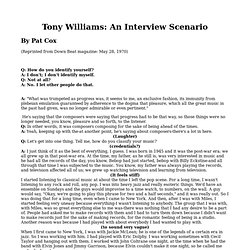
A: I don't; I don't identify myself. Q: Not at all? A: No. I let other people do that. Pages of Fire: Articles: Tony Williams: The Final Interview. (Reprinted from Down Beat magazine: April 1997) At press time, we learned of the sudden death of Tony Williams, who suffered a heart attack on Feb. 23 after undergoing routine gall bladder surgery.

The following article, which was already in place for this issue, is based on Down Beat's last interview with Williams. A full obituary will appear in our next issue. All you need to know about Tony Williams can be found in Miles Davis' caustic, cut-no-slack autobiography. Www.effingham.net/bishop/TonyWilliamsInterview.htm. Tony Williams by Bill Milkowski This interview was excerpted from the August 1997 issue of Modern Drummer.
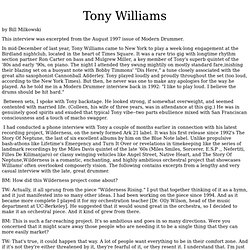
In mid-December of last year, Tony Williams came to New York to play a week-long engagement at the Birdland nightclub, located in the heart of Times Square. Drummer Tony Williams: "Good Musicians Copy" Tony Williams, NYC 1965.
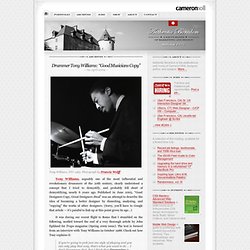
Photograph by Francis Wolff. Tony Williams, arguably one of the most influential and revolutionary drummers of the 20th century, clearly understood a concept that I tried to demystify, and probably fell short of demystifying, nearly 6 years ago. Published in June 2003, “Good Designers Copy, Great Designers Steal” was an attempt to describe the idea of becoming a better designer by dissecting, analyzing, and “copying” the works of other designers.
(Sorry, you’ll have to Google that article — it’s painful to link up at this point given its age…) It was during our recent flight to Rome that I stumbled on the following, nestled toward the end of a very thorough article by John Ephland for Traps magazine (Spring 2009 issue). If you’re going to pick just one style of playing and you can only play that way, that’s what you want to do … I don’t discourage that. 1978 Modern Drummer interview: Tony Williams. From the Modern Drummer digital archive, here are some excerpts from a 1978 interview with Tony Williams.
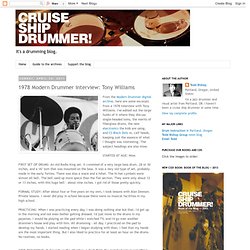
I've edited out the large hunks of it where they discuss single-headed toms, the merits of fiberglass drums, the new electronics the kids are using, and CS Black Dots vs. calf heads, keeping just the essence of what I thought was interesting. The subject headings are also mine. STARTED AT AGE: Nine. 1985 Modern Drummer interview: Alan Dawson. Have I mentioned lately what a great resource the Modern Drummer digital archive is?
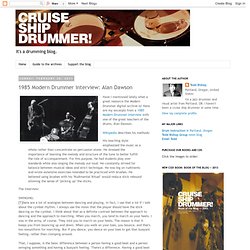
Here are my excerpts from a 1985 Modern Drummer interview with one of the great teachers of the drums, Alan Dawson. Wikipedia describes his methods: His teaching style emphasized the music as a whole rather than concentrate on percussion alone. He stressed the importance of learning the melody and structure of the tune to better fulfill the role of accompaniment. For this purpose, he had students play over standards while also singing the melody out loud. The interview: The Development of the Drumset (up to about 1935) One of the greatest and most dangerous drummers right now is also one of the most unknown.

He’s a Houston native named Chris Dave and he masterfully plays everything from jazz to fusion to soul to hip-hop. He has performed and recorded with Kenny Garrett, Pat Metheny, Ron Blake, Robert Glasper, Erykah Badu, Mos Def, Mary J. Blige, Adele, and many more huge names. He plays the drumset with a prowess and a confidence, similar to the way Albert Pujols plays baseball or the way one would imagine a World War II sniper would track his target.
His wisdom on how drummers should approach the instrument is all about respect and humility, particularly for the history of the drumset: “Do you have enough respect for the instrument to really learn it? The history of the drumset is a very American development in that it is a melting pot of cultures and contributions. The concept of a drum is as old as history itself. Straight cymbal stands were a no-brainer as far as mounting cymbals. The History of Jazz Drumming.